Country Star Partners with New Leash on Life
Lorrie Morgan
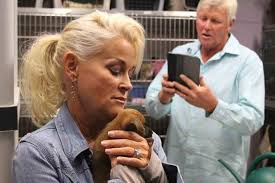 Outspoken Country Artist Lorrie Morgan is our guest. She walks the walk when it comes to the animals. From putting on fundraising concerts to helping in the shelter, she's involved with supporting her local animal welfare organization, New Leash on Life Pet Adopt Center in Lebanon, Tennessee (check out the video). Lorrie has Pit Bulls at home and thinks they're so misunderstood.
Outspoken Country Artist Lorrie Morgan is our guest. She walks the walk when it comes to the animals. From putting on fundraising concerts to helping in the shelter, she's involved with supporting her local animal welfare organization, New Leash on Life Pet Adopt Center in Lebanon, Tennessee (check out the video). Lorrie has Pit Bulls at home and thinks they're so misunderstood.
The mission on New Leash on Life is to establish permanent adoption of abandoned cats and dogs. The center provides shelter, food, medical care and basic training to each rescued animal and became a no-kill shelter in 2009. It has found homes for more than 13,000 dogs and cats.
Lorrie said she wanted to get involved with a local shelter after viewing the negative treatments of animals online and in the news. She likes the no-kill aspect of it, because she doesn't like anything to be killed or euthanized, and she wanted to show her support.
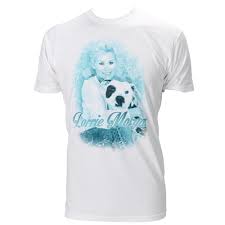 Lorrie helps support New Leash on Life by doing benefit concerts as well as directing as many people as she can who are ready to adopt to check out their animals instead of going to breeders. She has also created a T-shirt featuring one of her dogs, Weezie (named after the rapper) to the shelter and its efforts to improve the welfare of the animals, placement, education and awareness of animal cruelty. For more information and to purchase a "Lorrie & Weezie" T-shirt, visit lorrie.com.
Lorrie helps support New Leash on Life by doing benefit concerts as well as directing as many people as she can who are ready to adopt to check out their animals instead of going to breeders. She has also created a T-shirt featuring one of her dogs, Weezie (named after the rapper) to the shelter and its efforts to improve the welfare of the animals, placement, education and awareness of animal cruelty. For more information and to purchase a "Lorrie & Weezie" T-shirt, visit lorrie.com.
As you can tell, Lorrie has a soft spot for Pit Bulls and says her favorite show is Pit Bulls and Parolees. She believes these dogs are misunderstood and thinks of them as the, "Island of the misfits." She states Pit Bulls are very sensitive and beautiful dogs. They are also extremely smart and loyal dogs that have received a bad rap. Lorrie states that at one time she had a Chihuahua and said if he were a Pit Bull, she'd be dead! She states that the Chihuahua bit her many times and was meaner than her Pit Bulls and was a better guard dog.
Lorrie believes the bad rap comes from how they are raised, where they have been fought and trained, as well as all of the inbreeding. Because Pit Bulls are such a loyal breed, people have also taken advantage of their good nature and how they want to please their master by making them do unwanted behaviors.
When it comes to animal cruelty, Lorrie is not afraid to speak her mind. She tells us she can't stand to see all of the videos on Facebook on animal cruelty, because she wants to know who the person is who is filming them! She said she would like to smack the person behind the camera. Now, her husband won't let her go on Facebook after 9:00pm, because she doesn't sleep at night after watching them.
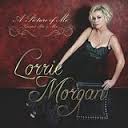 Lorrie has four pets at home, which include two Pit Bulls, one named Weezie and another named Puddin, as well as two Great Pyrenees' named Abby and Ray. She states that her dogs are welcome to get on the bed with them just before they go to bed, but that they also have their assigned sleeping places. However, this doesn't stop Weezie from sneaking on the bed in the middle of the night. Lorrie says when they wake up; there he is between her and her husband. She doesn't know how he does it, as he is so quiet and she calls him a "Silent little bed creeper."
Lorrie has four pets at home, which include two Pit Bulls, one named Weezie and another named Puddin, as well as two Great Pyrenees' named Abby and Ray. She states that her dogs are welcome to get on the bed with them just before they go to bed, but that they also have their assigned sleeping places. However, this doesn't stop Weezie from sneaking on the bed in the middle of the night. Lorrie says when they wake up; there he is between her and her husband. She doesn't know how he does it, as he is so quiet and she calls him a "Silent little bed creeper."
No mater what people call her, Lorrie says she loves her animals and that animals help people live longer and be happier.
Lorrie continues to record albums and recently release 2 new albums, back-to-back. Following the February 12 release of her first new studio album in five years, Letting You Go… Slow, released by Shanachie Entertainment, as well as her brand new compilation album, A Picture Of Me - Greatest Hits & More.
Visit Website
If A Natural Disaster Strikes, What Will Happen To Your Pet?
Karissa Hadden, Animal Storm Squad, Nat Geo
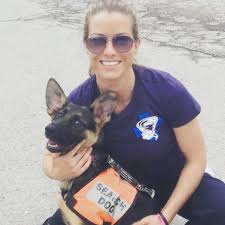 Karissa Hadden chases natural disasters rescuing thousands of animals that have been injured, trapped or displaced as a result of tornadoes, hurricanes, floods, wildfires, earthquakes and other catastrophes. Her life is documented in the new Nat Geo Wild television show, Animal Storm Squad.
Karissa Hadden chases natural disasters rescuing thousands of animals that have been injured, trapped or displaced as a result of tornadoes, hurricanes, floods, wildfires, earthquakes and other catastrophes. Her life is documented in the new Nat Geo Wild television show, Animal Storm Squad.
Every year, thousands of animals are injured, trapped or displaced as a result of tornadoes, hurricanes, floods, wildfires, earthquakes and other natural disasters. Traditional first responders are not equipped to assist animals, leaving them helpless in the wake of catastrophe. One such responder is Animal Storm Squad, who is able to save a lot of these animals.
Karissa lead the Animal Storm Squad in one of the charity's fully equipped vans, carrying animal medical supplies, lifesaving equipment, cages for transport and communication technology. She oversees caring and transporting each rescued pet to safety or to its owners.
What you will see on the show is a group of very dedicated, trained volunteers that go into natural disasters after the fact and get the animals out. These animals are triaged, transported to vets and ultimately reunited with their owners.
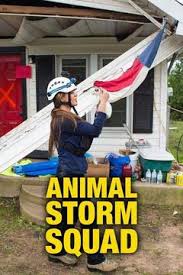 Karissa was inspired to do something after trying to help some kittens that were ultimately lost in the EF5 tornado that hit Moore, Oklahoma, in May 2013. At the time, her good friend, Dave Holder who was a meteorologist, was tracking the storm. Dave called Karissa and told her that he had found a litter of 5 very tiny kittens. He was in a complete panic as the mother had been killed and he didn't know what to do. Karissa's day job is a veterinary assistant, so she was able to tell him what to do. However, because of all of the devastation and downed phone lines, Karissa was not able to find a local vet. Finally, hours later, Dave was able to find a shelter to take the kittens. Sadly, the next day three out of the five kittens passed away.
Karissa was inspired to do something after trying to help some kittens that were ultimately lost in the EF5 tornado that hit Moore, Oklahoma, in May 2013. At the time, her good friend, Dave Holder who was a meteorologist, was tracking the storm. Dave called Karissa and told her that he had found a litter of 5 very tiny kittens. He was in a complete panic as the mother had been killed and he didn't know what to do. Karissa's day job is a veterinary assistant, so she was able to tell him what to do. However, because of all of the devastation and downed phone lines, Karissa was not able to find a local vet. Finally, hours later, Dave was able to find a shelter to take the kittens. Sadly, the next day three out of the five kittens passed away.
This was the moment that Karissa decided she wanted to start an organization that could help save these animals as quickly as possible after a natural disaster and get them back to their owners.
Things changed back in 2005 after Katrina, where people had to leave their animals behind. Now, if residents are given enough time to evacuate, they are taking their animals with them. But, Karissa heard many stories about wildfires in that people weren't aware of fires being so close until they smelled smoke and then it was too late. The people only had time to grab their keys and their kids and didn't have time to find all of their animals.
Luckily, Animal Storm Squad has Eric Fox, who constantly monitors tornadoes, potential floods and wild fire. This gives them a general idea of what to expect. Of course, that can change in minutes, so they are always preparing and getting themselves ready to deploy anywhere in the country at a moment's notice.
Karissa currently lives in Ontario, Canada and is an animal expert and veterinary assistant who founded the charity Never Stop Saving Animal Disaster Rescue Transport.
The Ninth Life of a Blind Wonder Cat
Gwen Cooper, HOMER
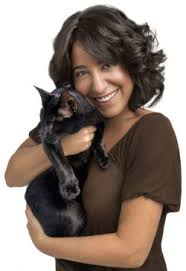 Homer was a blind, black cat that never knew sight. His owner, Gwen Cooper, realized this precious ball of fur was filled with lots of life-lessons. Gwen's second book about Homer will leave you delighted to have shared in his journey through words. She'll talk about the impact of handicapped pets in her life.
Homer was a blind, black cat that never knew sight. His owner, Gwen Cooper, realized this precious ball of fur was filled with lots of life-lessons. Gwen's second book about Homer will leave you delighted to have shared in his journey through words. She'll talk about the impact of handicapped pets in her life.
Homer was Gwen Cooper's little blind cat that she adopted when he was about 3 weeks old and had until he was 17 years old, losing him in 2013.
Homer was originally a neglected and unwanted blind kitten. He was actually born with eyes, but also born with an eye infection that he inherited from his mother. It was thought that Homer never was able to see because he had this infection before his eyes ever opened. Homer had his eyes surgically removed at the age of 2 weeks.
Despite all of this, Homer was an incredibly happy, fearless, amazing cat. Gwen doesn't even feel that Homer knew that there was such a thing as vision.
Gwen felt that Homer thought his "mommy" was omniscient, because he thought that quiet was the same thing as invisible. This lead Homer to try to get away with things in plain sight of her, that he knew he was not supposed to do, and he did them very quietly. Homer never stopped being startled when Gwen would catch him in the act and tell him, "No!" He could never figure out how Gwen knew, and she always knew!
When asked if he was harder to care for than a "normal" cat, Gwen stated, "Absolutely not." Six years ago when Gwen decided to write her first book about Homer (Homer's Odyssey) that is the first thing she wanted to convey. She originally had a lot of trepidations and concerns about adopting a blind kitten. Plus, she was quite young at the time herself. She also didn't feel if she was a good fit for a special needs animal.
Even though it wasn't that hard, Gwen states that there were a few, very simple, common sense adjustments. Some of these adjustments were for her benefit as well as for Homer's. One thing she changed was to stop leaving things lying around on the floor so he wouldn't trip over them. Gwen states that this was a habit that was time for her to grow out of anyway.
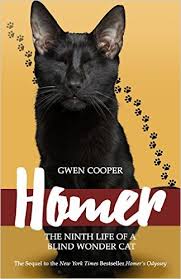 While Homer was fearless, there were still a lot more things for him to be afraid of than he even knew, but he didn't see them, and so he lived his life.
While Homer was fearless, there were still a lot more things for him to be afraid of than he even knew, but he didn't see them, and so he lived his life.
Gwen said she learned from all of this that there are, "Blind leaps of faith." There are things in life that are scary, and if you over think them, you don't do them. Sometimes you just have to close your eyes and jump.
Gwen adopted two other kittens after Homer, with one only having three legs, named Clayton. Clayton took immediately to Homer, with sort of a hero worship, and always waited for Homer to do something interesting.
One thing Gwen likes to emphasize, that is at the end of the day a special needs animal is still just an animal, who is capable of loving you and living an amazing life as any other animal. She also stated that there weren't any additional expenses in adopting a blind cat.
Gwen Cooper is the New York Times bestselling author of the memoir "Homer's Odyssey: A Fearless Feline Tale, or How I Learned About Love and Life with a Blind Wonder Cat" and "Homer: The Ninth Life of a Blind Wonder Cat." She also manages Homer's ongoing social-media community, which reaches nearly two million cat enthusiasts and rescuers around the world each day. Gwen lives in Manhattan with her husband, Laurence. She also currently lives with her two perfect cats - Clayton the Tripod and his littermate, Fanny - who aren't impressed with any of it.
Visit Website
Get Your Pet To the Vet Safely with No Escapees - Dr. Debbie
 A frightening situation occurred the other day at my veterinary hospital. Working inside my office, I could hear a woman's shrieks coming from the parking lot. I ran outside to find a woman with one dog on a leash, and the other dog skittering about the parking lot - the result of a slipped collar. The owner would approach the panicked dog and he'd retreat, darting under nearby cars. Those familiar with our hospital location understand its proximity to a busy intersection. Should the dog run in the wrong direction, he'd meet up with 45 mph traffic.
A frightening situation occurred the other day at my veterinary hospital. Working inside my office, I could hear a woman's shrieks coming from the parking lot. I ran outside to find a woman with one dog on a leash, and the other dog skittering about the parking lot - the result of a slipped collar. The owner would approach the panicked dog and he'd retreat, darting under nearby cars. Those familiar with our hospital location understand its proximity to a busy intersection. Should the dog run in the wrong direction, he'd meet up with 45 mph traffic.
My staff was outside in moments to assist the owner in retrieving her dog and safely escorted everyone into the building. Thankfully my client's few minutes of terror ended uneventfully. But that's not always the case. I've seen dogs run straight into the road, cat's leap from a family member's arms, and owners dive into oncoming traffic trying to catch an escaping pet.
The lesson is simple. Don't underestimate your pets' fears. Fear of car travel, new places or the veterinary office can cause a pet to behave in unpredictable ways. If you know your pet to be nervous with new people or new situations, be especially vigilant when transporting your pet in a vehicle.
Identify Your Pet
Use two methods of identification for best insurance your pet is returned to you if lost. Permanent identification with a microchip is a must and should be complimented with a collar and ID tags.
Restrain Pet in Vehicle
Keep your pet secure during travel and when the car door opens by using a doggie seatbelt. Small dogs and cats should be housed in a pet carrier which is secured with seatbelt to avoid undue carrier movement during travel. Do not allow cats and small pets to roam freely in the car. Cats have been known to take cover under car seats which may require sedation or seat removal to extract kitty from her hiding place.
Check for Proper Fit
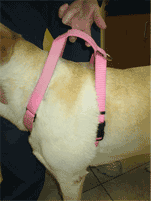

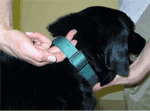 A proper fitting collar allows 2 finger widths between the collar and pet's neck. Allow more than, and should your pet put on the brakes, he'll easily slip out of the collar. Poor fitting harnesses are just as dangerous and allow gap room which allows a back-peddling pet to wiggle out. Not sure if the collar is too loose? Snug the collar up one fitting in anticipation of your trip to the vet.
A proper fitting collar allows 2 finger widths between the collar and pet's neck. Allow more than, and should your pet put on the brakes, he'll easily slip out of the collar. Poor fitting harnesses are just as dangerous and allow gap room which allows a back-peddling pet to wiggle out. Not sure if the collar is too loose? Snug the collar up one fitting in anticipation of your trip to the vet.
Try Other Collar Styles
Even if you don't normally use a choker or pinch collar, consider using one when going to the vet's office. For thick necked dogs with smaller head size, try the Martingale collar, a fabric and metal combo collar that snugs down should your dog try to back out. Boisterous dogs that jump and leap when on leash may benefit wearing a head collar that fits over the muzzle. Ensure your collar choice is properly fitted, since any of these styles can fail if improperly fitted or used incorrectly.
Call Ahead
If you anticipate difficulties getting your pet to the vet's office, call ahead. Veterinary staff members are on the ready to help ensure your pet's visit is a safe one.
So, take a few minutes to consider your pet's travel safety before heading out on that next car trip, whether it is to the park, groomer or veterinary office. Your four legged friend will thank you, but may pout on the way there.
Featured veterinarian known as "Dr. Debbie" on national pet radio program, Animal Radio. Ebook author of "Yorkshire Terriers: How to Be Your Dog's Best Friend"; "Pugs: How to Be Your Dog's Best Friend"; "Mini Schnauzers: How to Be Your Dog's Best Friend"; and "Shih Tzu: How to Be Your Dog's Best Friend." Dr. Debbie's books.
Visit Website
4 Things Dog Parents Know That Others Don't
Robert Semrow, Animal Radio Listomania
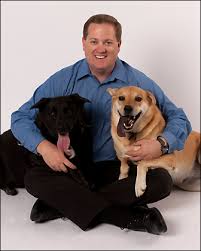 Robert Semrow, your pet world insider, is here with this week's Animal Radio Listomania.
Robert Semrow, your pet world insider, is here with this week's Animal Radio Listomania.
Are you a dog parent who is constantly scrutinized by people without pets? Well, take pride in knowing that your house is not only filled with unconditional love, but also deeper knowledge of life. That's right, here are just a few things that dog owners know that those without a dog, don't.
To begin with, it's truly important and socially enlightening to have someone special to share any meal with. In fact, it's even better for dog owners because your dog is more than happy to let you choose what that meal is. Are you feeling steak or chicken? So is your pooch. Maybe you want pasta. That's fine with your dog too. See, there's no wrong decision or hours of debating what to have. When it comes to meals with your dog - the decision is simple - let's eat!
Next - Sharing is expected in a household with a dog. There is no mine or yours, just who got there first and who has the bigger bark. See, dogs are more than happy to share their spot with you and they know that even though you may not think there is enough room on that chair or sofa or bed for them, they'll make it work. No need to worry, it's in their DNA - That's right that DNA - Dogs Need Affection.
Next - Without a dog, most humans would sit on the couch, never put down their electronics and probably rarely get any real exercise. Instead, dog owners get the joy and privilege of getting up and getting moving quickly. Dogs have learned if you want to get your human moving quickly, just let them know if they don't let you out first thing in the morning they will be on their hands and knees cleaning the first indoor dew droppings of the day. Additionally, walking to your car is not enough exercise, but a walk around the neighborhood or park, with a few bend at the knees to pick up a dog made road hazard exercises, will keeps you in better shape than another game on your phone or tablet.
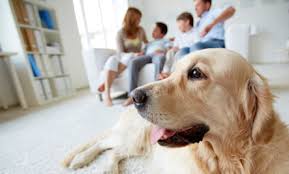 Finally, if you have kids, you know that having a dog is essential life training. Yes, there is taking care of another being and learning about love and friendship, but I'm referring to something more important. That is, having the ultimate wingman. If your kid wants to play, their faithful pooch is there to play. If your child makes a mess - their pooch is happy to take the blame and if your child is forced to eat food that no one really wants to eat, their pooch is there to take one for the team and if not eat it, at least bury it somewhere a parent won't find it till it's too late to be mad.
Finally, if you have kids, you know that having a dog is essential life training. Yes, there is taking care of another being and learning about love and friendship, but I'm referring to something more important. That is, having the ultimate wingman. If your kid wants to play, their faithful pooch is there to play. If your child makes a mess - their pooch is happy to take the blame and if your child is forced to eat food that no one really wants to eat, their pooch is there to take one for the team and if not eat it, at least bury it somewhere a parent won't find it till it's too late to be mad.
Yes, the ultimate wingman even extends to you single folks. Take that pup out for a walk or run on the weekend and they will introduce to the world and many of inhabitants, just because they care like no one else in your life does.
Dogs are a gift from the heavens, and if you don't think so, you DON'T have one in your life.
Share your ideas on what only dog owners know on the Animal Radio Facebook Page.
Visit Website
Animal Radio News - Lori Brooks
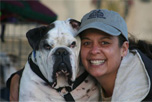 Rescue Dogs Become "Ball Boys" at Tennis Tournament
Rescue Dogs Become "Ball Boys" at Tennis Tournament
In Brazil, four rescue dogs from a shelter were employed as "ball boys" at the Brazil Open Tennis Tournament. It was a brilliant move on the part of Brazilian dog lovers and trainers who took the mistreated dogs and gave them their new occupation by training them to feel at home on the tennis court and get them used to the noise of the crowds and the high speed of the balls they were fetching. They all did a fantastic job and were a huge hit with the sports fans.
Pit Bulls Could Be Next Generation of K9 Officers
We've grown used to seeing German Shepherds and Belgian Malinois as police dogs, but how would you feel if Pit Bulls become the next generation of K-9 officers? It's happening now. Two organizations have joined forces to save pit bulls from shelters and train them to become police dogs. Animal Farm Foundations covers the cost of the training while Universal K9 prepares the dogs to be outstanding citizens and K9 officers. The program has successfully placed nine pit bulls across different police departments.
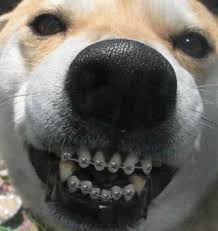 "Doggy Dentist" Fits Dogs with Braces
"Doggy Dentist" Fits Dogs with Braces
A Michigan veterinarian has earned the title of "doggy dentist" for his practice of fitting dogs with braces and performing root canals after a photo of a golden retriever puppy wearing braces was shared all over on the internet. Dr. Jim Moore says while it may be unusual to see a dog wearing braces, he stresses the importance of animals' dental health and says, "Orthodontia in pets is normally not for aesthetic purposes, but because of health concerns."
French Bulldogs Climbing Ranks as Favorite Dog
Labrador retrievers still reign supreme after a quarter century as America's favorite purebred dog. However, French Bulldogs are on the rise on this latest list and some lesser-known breeds are climbing the popularity ladder too, according to American Kennel Club rankings. Known for being easygoing, fun loving, multitalented and friendly, Labs have held the top spot for longer than any other breed since the AKC started keeping track in the 1880s. Rounding out the top 10 in order: German Shepherds, Golden Retrievers, English Bulldogs, Beagles, French Bulldogs, Yorkshire Terriers, Poodles, Rottweilers and Boxers. French bulldogs moved from No. 9 to No. 6 on the new list and became the predominant purebred in Miami and San Francisco, having already conquered New York City. They weren't even in the top 50 as recently as 2002. Some other breeds rising in popularity include: the Cane Corso, an imposing Italian guard dog that rose from 47th to 35th and the Norwegian Elkhound, a hunting dog that's up from 100th to 88th. What about breeds declining in popularity? Dachshunds and Shih Tzus dropped out of the top 10 within the last five years. Boston Terriers, Cocker Spaniels and St. Bernards were No. 1 in decades past but aren't even in the top 20 now.
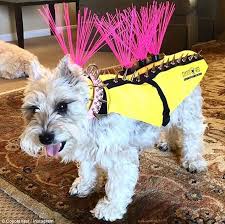 Punk Rocker-ish Vest Protects Your Pet From Coyotes
Punk Rocker-ish Vest Protects Your Pet From Coyotes
A San Diego, California couple have invented a vest that dogs can wear to protect them from coyote attacks. Inspired by the loss of their dog Buffy, who was killed by a coyote, it left the couple angry, but wondering what could they do to keep other dogs safe from the same fate. That's when they came up with the idea for the protective vest. It may make the dog look a little bit punk rocker-ish though, since the vest has plastic spikes on it around the collar area and has quills that run up and down the length of the back, from neck to butt. So far they've sold 120 of the CoyoteVest and they've fielded so many orders, they've had to talk to someone about manufacturing the vests, just to keep up.
 Listen to the entire Podcast of this show (#1064)
Listen to the entire Podcast of this show (#1064)





